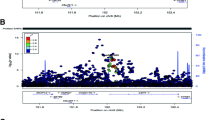Abstract
A recent genome-wide association study (GWAS) has identified a new subset of breast cancer susceptibility loci on chromosomes 9, 10, and 11 in populations of European descent. However, because of the genetic heterogeneity, the role of these loci in non-European descent populations is still unclear. To evaluate the relationships between genetic variants in these regions identified by GWAS and breast cancer risk in Chinese women, we genotyped four common SNPs at 9p21(rs1011970 and rs10757278), 10p15 (rs2380205), and 10q22 (rs1250009) in a two-stage case–control study with a total of 1792 breast cancer cases and 1,867 controls. We found that rs1250009 at 10q22 was consistently associated with risk of breast cancer in stage 1 and stage 2, with a per-allele OR of 1.13 (95% CI 1.02–1.25) after two stages combined (P = 0.023). However, no significant associations were observed between the other three SNPs and breast cancer risk. Our results suggest that the genetic variants at 10q22 may play an important role in breast cancer development in Chinese women, and rs1250009 may be a candidate marker for breast cancer susceptibility.
Similar content being viewed by others
References
Ferlay J, Shin HR, Bray F et al (2010) Estimates of worldwide burden of cancer in 2008: GLOBOCAN 2008. Int J Cancer 127:2893–2917
Coughlin SS, Ekwueme DU (2009) Breast cancer as a global health concern. Cancer Epidemiol 33:315–318
Porter P (2008) ‘‘Westernizing’’ women’s risks? Breast cancer in lower-income countries. N Engl J Med 358:213–216
Lichtenstein P, Holm NV, Verkasalo PK et al (2000) Environmental and heritable factors in the causation of cancer–analyses of cohorts of twins from Sweden, Denmark, and Finland. N Engl J Med 343:78–85
Chen YC, Hunter DJ (2005) Molecular epidemiology of cancer. CA Cancer J Clin 55:45–54
Easton DF, Pooley KA, Dunning AM et al (2007) Genome-wide association study identifies novel breast cancer susceptibility loci. Nature 447:1087–1093
Stacey SN, Manolescu A, Sulem P et al (2007) Common variants on chromosomes 2q35 and 16q12 confer susceptibility to estrogen receptor-positive breast cancer. Nat Genet 39:865–869
Hunter DJ, Kraft P, Jacobs KB et al (2007) A genome-wide association study identifies alleles in FGFR2 associated with risk of sporadic postmenopausal breast cancer. Nat Genet 39:870–874
Stacey SN, Manolescu A, Sulem P et al (2008) Common variants on chromosome 5p12 confer susceptibility to estrogen receptor-positive breast cancer. Nat Genet 40:703–706
Thomas G, Jacobs KB, Kraft P et al (2009) A multistage genome-wide association study in breast cancer identifies two new risk alleles at 1p11.2 and14q24.1 (RAD51L1). Nat Genet 41:579–584
Ahmed S, Thomas G, Ghoussaini M et al (2009) Newly discovered breast cancer susceptibility loci on 3p24 and 17q23.2. Nat Genet 41:585–590
Zheng W, Long J, Gao YT et al (2009) Genome-wide association study identifies a new breast cancer susceptibility locus at 6q25.1. Nat Genet 41:324–328
Turnbull C, Shahana A, Morrison J et al (2010) Genome-wide association study identifies five new breast cancer susceptibility loci. Nat Genet 42:504–507
Bishop DT, Demenais F, Iles MM et al (2009) Genome-wide association study identifies three loci associated with melanoma risk. Nat Genet 41:920–925
Stacey SN, Sulem P, Masson G et al (2009) New common variants affecting susceptibility to basal cell carcinoma. Nat Genet 41:909–914
Shete S, Hosking FJ, Robertson LB et al (2009) Genome-wide association study identifies five susceptibility loci for glioma. Nat Genet 41:899–904
Zeggini E, Weedon MN, Lindgren CM et al (2007) Replication of genome-wide association signals in UK samples reveals risk loci for type 2 diabetes. Science 316:1336–1341
Helgadottir A, Thorleifsson G, Manolescu A et al (2007) A common variant on chromosome 9p21 affects the risk of myocardial infarction. Science 316:1491–1493
Sharma M, Li X, Wang Y et al (2003) hZimp10 is an androgen receptor co-activator and forms a complex with SUMO-1 at replication foci. EMBO J 22:6101–6114
Li X, Thyssen G, Beliakoff J et al (2006) The novel PIAS-like protein hZimp10 enhances Smad transcriptional activity. J Biol Chem 281:23748–23756
Lee J, Beliakoff J, Sun Z (2007) The novel PIAS-like protein hZimp10 is a transcriptional co-activator of the p53 tumor suppressor. Nucleic Acids Res 35:4523–4534
Karlseder J, Zeillinger R, Schneeberger C et al (1994) Patterns of DNA amplification at band q13 of chromosome 11 in human breast cancer. Genes Chromosome Cancer 9:42–48
Liu Y, Sanoff HK, Cho H et al (2009) INK4/ARF transcript expression is associated with chromosome 9p21 variants linked to atherosclerosis. PLoS One 4:e5027
Jiang Y, Shen H, Liu X et al (2011) Genetic variants at 1p11.2 and breast cancer risk: a two-stage study in Chinese women. PLoS One 6:e21563
Chen F, Chen GK, Millikan RC et al (2011) Fine-mapping of breast cancer susceptibility loci characterizes genetic risk in African Americans. Hum Mol Genet 20:4491–4503
Hutter CM, Young AM, Ochs-Balcom HM et al (2011) Replication of breast cancer GWAS susceptibility loci in the women’s health initiative African American SHARe study. Cancer Epidemiol Biomarkers Prev 20:1950–1959
Beliakoff J, Lee J, Ueno H et al (2008) The PIAS-like protein Zimp10 is essential for embryonic viability and proper vascular development. Mol Cell Biol 28:282–292
Cartegni L, Wang J, Zhu Z et al (2003) ESEfinder: a web resource to identify exonic splicing enhancers. Nucleic Acids Res 31:3568–3571
Acknowledgments
Funding support for this project was provided by the National Natural Science Foundation of China (grant number 81071715; 81102179), Key Grant of Natural Science Foundation of Jiangsu Higher Education Institutions (09KJA330001), The Program for Changjiang Scholars and Innovative Research Team in University (IRT0631).We thank the study participants and research staff for their contributions and commitment to this study.
Conflicts of interest
No potential conflicts of interest were disclosed.
Author information
Authors and Affiliations
Corresponding author
Electronic supplementary material
Below is the link to the electronic supplementary material.
Rights and permissions
About this article
Cite this article
Chen, J., Jiang, Y., Liu, X. et al. Genetic variants at chromosome 9p21, 10p15 and 10q22 and breast cancer susceptibility in a Chinese population. Breast Cancer Res Treat 132, 741–746 (2012). https://doi.org/10.1007/s10549-011-1927-y
Received:
Accepted:
Published:
Issue Date:
DOI: https://doi.org/10.1007/s10549-011-1927-y




